认知心理学注意
认知心理学知识点总结
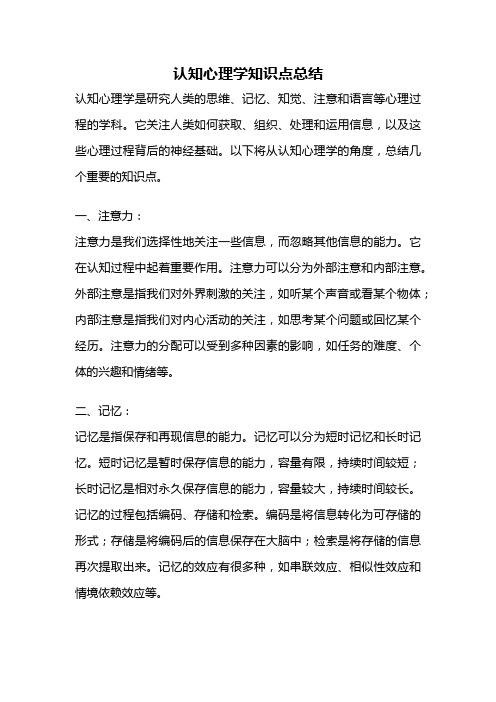
认知心理学知识点总结认知心理学是研究人类的思维、记忆、知觉、注意和语言等心理过程的学科。
它关注人类如何获取、组织、处理和运用信息,以及这些心理过程背后的神经基础。
以下将从认知心理学的角度,总结几个重要的知识点。
一、注意力:注意力是我们选择性地关注一些信息,而忽略其他信息的能力。
它在认知过程中起着重要作用。
注意力可以分为外部注意和内部注意。
外部注意是指我们对外界刺激的关注,如听某个声音或看某个物体;内部注意是指我们对内心活动的关注,如思考某个问题或回忆某个经历。
注意力的分配可以受到多种因素的影响,如任务的难度、个体的兴趣和情绪等。
二、记忆:记忆是指保存和再现信息的能力。
记忆可以分为短时记忆和长时记忆。
短时记忆是暂时保存信息的能力,容量有限,持续时间较短;长时记忆是相对永久保存信息的能力,容量较大,持续时间较长。
记忆的过程包括编码、存储和检索。
编码是将信息转化为可存储的形式;存储是将编码后的信息保存在大脑中;检索是将存储的信息再次提取出来。
记忆的效应有很多种,如串联效应、相似性效应和情境依赖效应等。
三、知觉:知觉是指我们通过感觉器官获取和理解外界信息的过程。
感觉器官包括视觉、听觉、触觉、嗅觉和味觉等。
感觉器官接收到外界的刺激后,会将其转化为神经信号,并传递到大脑中进行处理。
知觉过程中存在很多错觉现象,如视觉上的错觉、听觉上的错觉和触觉上的错觉等。
四、概念:概念是指对事物的一般性的思维表达。
它是人类对事物进行分类和归纳的基础。
概念可以分为原型概念和概括概念。
原型概念是指我们对某一类事物的典型代表的认知,如对鸟的典型代表是鹦鹉;概括概念是指我们对某一类事物的整体认知,如对鸟的整体认知是有羽毛、有翅膀的动物。
五、语言:语言是人类交流和思维的工具。
它涉及到词汇、语法和语义等方面。
语言的习得和使用是一个复杂的过程,涉及到大脑的多个区域。
语言的习得过程可以通过婴儿的语言发展来研究,而语言的使用过程可以通过语言理解和语言产生来研究。
第三章 注意 认知心理学(课件)

*选择性注意研究(4)
• 蒙布莱(Mowbray,1953)进一步研究发 现: 让被试同时注意两种信息。被试收听一个 故事,与此同时安静地阅读另一则故事, 其内容与录音呈现的故事毫无关系。然后 让被试做一项测验,了解其对两个故事理 解的情况。几乎所有的被试对第一个故事 的理解比对另一个故事的理解要好的多。
大量刺激 中一次一 个方式进 行。
输入
感觉登记
选择性过滤
觉察器
短时记忆
记忆时间很短,但内容是最
初刺激的精确表象;在感觉
登记中刺激受到前注意分析, 它决定刺激物理特征;
过滤器决定哪
些刺激接受进 一步加工。
只有通过选择
性过滤器的刺
激,我们才能 “知晓”
反应
演示
实验依据
实验技术:双耳同时分听技术(不附加追随 程序)
2、中枢能量及其分配
Kahneman的容量分配模型
支持性实验一
Johnson & Heinz(1979)设计双耳同时分听 的追随靶子词实验。
在实验中设置了4个条件: a.感觉可辨度低条件:两类词都由男生读 出; b.感觉可辨度高条件:靶子词由男生读出, 非靶子词由女生读出; c.语义可辨度低条件:两类词同属一个范 畴; d.语义可辨度高条件:两类词分属不同范 畴。
inhibitionposner与cohen采用典型的返回抑制研究范式如图在屏幕中央并排出现三个大小相同的小框中间小框内有注视点要求被试始终盯住注视点接着外侧某一小框迅速闪烁一下通常是变亮叫线索化以吸引注意此即对外侧小框的线索化该线索常被称为外周线索主要是为了和后面出现的中间线索相区分然后以同样的方式对中间小框线索化该线索被称为中间线索centralcue使注意脱离外侧小框而被吸引到中间小框最后靶子出现在某个外侧小框要求被试迅速做出反应按键或眼睛扫视
认知(注意) 认知心理学
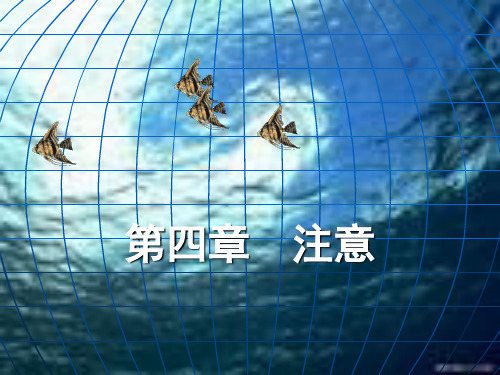
过程
• 将单词与数字混合组成刺激系列,分别呈现给左、右 两耳。其中两耳接受的单词可以构成一个有意义的句 子。
结果
• 被试者报告的顺序并不是“6-老鼠-2”和 “吃-9-奶 酪” ,而是报告成“老鼠-吃-奶酪”和“6-9-2”。
解释 6-老鼠-2
吃-9-奶酪 • 信息通道的物理特性不是信息选择的必要基础。 • 语义联系对信息选择起重要作用。 • 由于被试者根据语义来组合刺激,说明注意的选择不 是发生在信息加工之前,而是发生在信息加工之后。
中枢能量理论的解释
一、认知资源的有限性 认知资源理论把注意看做为对刺激信息进行识别 和加工的认知资源,其容量或能量是有限的。每 一项认知活动都需要占有可消耗一定的认知资源。 认知资源的有限性是指人在对刺激信息进行分类、 识别等加工的认知活动时受到心理能量的限制。 只有当认知任务所需要的资源之和不超过注意的 总资源时,注意协调和分配才能同时进行。否则 在进行某项认知任务时,其活动必然会受到阻碍。
一 过滤器模型(Filter model)
过滤器模型是由英国心理学家布鲁德本特根据双 耳分听的一系列实验结果提出的注意模型。它认 为来自外界的信息是大量的,但人的神经系统高 级中枢的加工能力极其有限,于是出现瓶颈。为 了避免系统超载,需要过滤器加以调节,选择一 些信息进入高级分析阶段,而其余信息可能暂存 于某种记忆之中,然后迅速衰退。通过过滤器的 信息受到进一步的加工而被识别和存储。这种过 滤器类似波段开关,可以接通一个通道,使该通 道的信息通过,而其余的信息则不能通过。
三 注意的材料限制和资源限制理论
诺曼(Norman)和波布罗(Bobrow)对人 的认知活动进行了区分。他们把人的认知活动或 认知操作分为两类,一种是资源限制 (Resource-limited)的认知活动或认知操作, 另一种是材料限制(data-limited)的认知活 动或认知操作。前者是指人的注意受到所分配的 认知资源的限制,一旦得到较多的认知资源,注 意分配便能顺利进行的认知活动过程。后者是指 人的注意受到刺激信息任务(刺激材料)的低劣 质量或不适宜加工的信息的限制,即使分配到了 较多的认知资源,也不能顺利完成的认知活动过 程。
认知心理学-注意

选择性注意
01
02
03
定义
选择性注意是指个体在同 时呈现多种刺激时,有选 择地关注某些刺激而忽略 其他刺激的认知过程。
影响因素
选择性注意受到个体差异、 刺激特征和任务需求等多 种因素的影响。
实验证据
双耳分听实验、视觉分心 任务等实验证明了选择性 注意的存在。
集中性注意
定义
集中性注意是指个体在一段时间内将注意力集中在特定任务或刺 激上的认知过程。
影响因素
集中性注意受到个体差异、任务难度和环境因素等多种因素的影 响。
实验证据
持续注意任务、警觉任务等实验证明了集中性注意的存在。
分散性注意
定义
分散性注意是指个体在一定时间内将注意力分散到多 个任务或刺激上的认知过程。
影响因素
分散性注意受到个体差异、任务特征和环境因素等多 种因素的影响。
实验证据
多任务处理实验、干扰任务等实验证明了分散性注意 的存在。
注意在工作中的应用
任务管理
在工作过程中,员工需要 集中注意力完成任务,避 免分散注意力,以提高工 作效率。
团队合作
在团队工作中,成员之间 需要相互关注、协调配合, 以确保团队目标的实现。
领导力
在领导工作中,领导者需 要关注团队成员的需求、 关注团队的整体状况,以 发挥领导力。
注意在教育中的应用
课堂学习
04 注意的应用
注意在日常生活中的应用
交通驾驶
人际交往
在驾驶过程中,驾驶员需要集中注意 力观察路况、判断交通状况,以确保 安全行驶。
在人际交往中,人们需要关注他人的 言行举止,注意自己的言行对他人的 影响,以建立良好的人际关系。
健康管理
在日常生活中,人们需要关注自己的 身体状况,注意饮食、运动和休息, 以保持身体健康。
认知心理学 第3章 注意
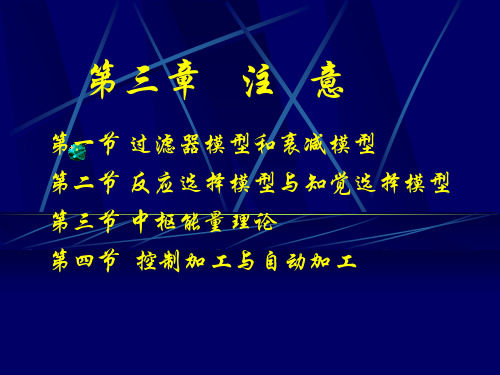
• 表明当有意义的材料由追随耳转到非追随耳时,被试会将 注意转向另一耳朵,表现出对意义的追随。
二、注意的衰减模型
该模型是Treisman(1964)年根据 追随实验中对非追随耳信息的信息也可 以得到加工的实验结果,对过滤器模型 加以改进的结果。
(一)基本思想
过滤器的作用是减弱信息的信号,受到衰减
(三)支持过滤器模型的实验证据
1. Broadbent 的双耳分听实验 2. Cherry 的双耳分听实验
Broadbent 的双耳分听实验 实验设计: 通过耳麦给被试两 耳同时放音,但每只 耳朵所接受的刺激信 息是不一样的。如右 图所示。通过实验考 察被试反应信息与双 耳接受信息的关系。 从而了解被试注意的 特点。
的信息仍可以进行高级加工。 已经贮存的信息在高级分析水平仍有不同的 兴奋阈限,衰减的信息也有可能激活一些兴 奋阈限很低的信息。
追随耳
非追随耳
物 理 特 征 分 析
选 择 性 过 滤 器
。。 。。 。。 。。 。。
意 义 分 析
反 应
衰减模型简图
(二)衰减模型与过滤模型的不同点:
对刺激信息 的加工方式
Broadbent过滤器模型
感觉
登记
选 择 性 过 滤 器
容量有限的高级 心理加工(知觉)
反应
长 时 记 忆
(二)过滤器模型的特点:
1. “过滤器”位于语义分析之前,即信息 加工的初级阶段; 2. “过滤器”按“全或无”的方式工作; 3. 刺激信息的物理特性决定它能否通过过 滤器,个体的知识经验等对刺激信息的筛选 并不起作用。
左耳
6 2 7
右耳
4 9 3
实验结果发现,被试在这样的实验中通常 采用两种应对策略: 1、 以耳朵为单位分别再现左右耳所听到的 信息;再现正确率为65%。 2、以双耳同时接收信息的顺序成对地再现信 息,如6,4;2,9....正确率为20%。
认知心理学视角下的注意力分配机制
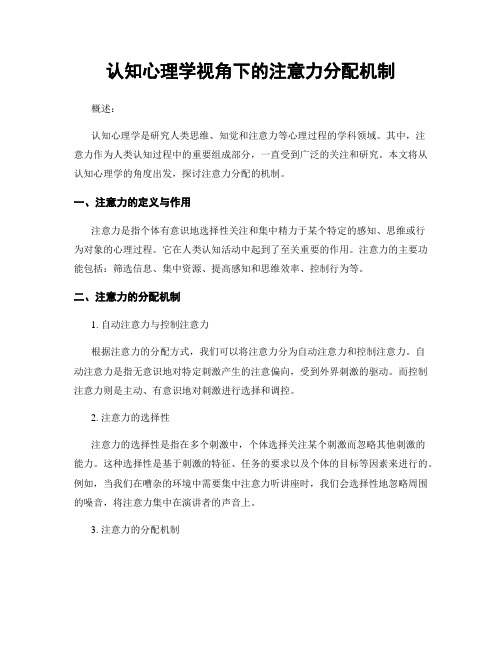
认知心理学视角下的注意力分配机制概述:认知心理学是研究人类思维、知觉和注意力等心理过程的学科领域。
其中,注意力作为人类认知过程中的重要组成部分,一直受到广泛的关注和研究。
本文将从认知心理学的角度出发,探讨注意力分配的机制。
一、注意力的定义与作用注意力是指个体有意识地选择性关注和集中精力于某个特定的感知、思维或行为对象的心理过程。
它在人类认知活动中起到了至关重要的作用。
注意力的主要功能包括:筛选信息、集中资源、提高感知和思维效率、控制行为等。
二、注意力的分配机制1. 自动注意力与控制注意力根据注意力的分配方式,我们可以将注意力分为自动注意力和控制注意力。
自动注意力是指无意识地对特定刺激产生的注意偏向,受到外界刺激的驱动。
而控制注意力则是主动、有意识地对刺激进行选择和调控。
2. 注意力的选择性注意力的选择性是指在多个刺激中,个体选择关注某个刺激而忽略其他刺激的能力。
这种选择性是基于刺激的特征、任务的要求以及个体的目标等因素来进行的。
例如,当我们在嘈杂的环境中需要集中注意力听讲座时,我们会选择性地忽略周围的噪音,将注意力集中在演讲者的声音上。
3. 注意力的分配机制注意力的分配机制可以通过两个过程来解释:底层特征处理和高层控制。
底层特征处理是指对刺激的感知特征进行初步处理,如颜色、形状等。
而高层控制则是指个体根据任务需求和目标,对注意力进行有意识的调控和分配。
4. 注意力的变化与转移注意力的变化和转移是指个体在不同任务和刺激之间进行注意力的调整和转换。
这种转移可以是外部刺激导致的,也可以是内部因素(如个体的目标、兴趣等)引起的。
例如,在进行学习时,我们可能需要将注意力从手机上的信息转移到书本上的内容。
三、注意力分配的影响因素1. 刺激特征刺激的特征对注意力的分配起到了重要的影响。
例如,亮度、颜色、运动等特征会引起注意力的吸引和转移。
2. 任务要求不同的任务对注意力的要求也不同。
一些任务需要集中注意力,而另一些任务则需要分散注意力。
认知心理学笔记第五章注意

第五章注意1、注意的理论模型:过滤器模型;衰减模型;反应选择模型;中枢能量及其分配2、普通心理学:注意是对一定对象的指向和集中。
注意与意识之间的关系。
认知心理学:强调注意在模式识别中的信息选择功能,提出注意的信息加工模型。
3、注意的研究简述:(1)冯特(1908):注意是伴随着心理内容清晰领会的状态;意识与视野一样,是以一定阈限为边界的一个有限领域,任何心理内容只有进入这个领域,才有被领会的可能。
在该领域内有一个范围狭小的中心区域,任何心理内容只有进入这个中心区域,才会获得最大的清晰性和鲜明性。
这个中心区域被称为“注意焦点”。
(2)James(1892):在《心理学教科书》一书中,把注意作为意识的特征之一。
(3)近代,谢林顿、埃克尔斯和克里克等诺贝尔奖获得者对其都有所阐述。
4、注意模型有人也把注意模型看作为模式识别模型:过滤器模型衰减模型反应选择模型5、过滤器模型:英国心理学家,Broadbent,《知觉和通讯》(1958),这部专著的出现,标志,行为主义心理学禁锢了多年的注意问题又重新回到心理学的研究领域中。
在Broadbent看来,象通讯系统一样,可以将整个神经系统看成信息传播速度有限的单一通道。
出于经济考虑,在容量有限的神经系统之前,需要一个选择性的过滤器或者开关,这种开关保护系统避免超载,只准许少量的被选择的信息通过过滤器,所有其他信息则受到阻挡。
此外,在选择性过滤器之后,有必要假设一个缓冲器。
这种缓冲器是一个暂时的记忆存储,未被选择的信息能够在其中短暂保留。
过滤器理论属于早期选择模型。
模型示意图:实验验证:1 刺激呈现是双耳分听(dichotic listening task),即同时呈现,每秒2个数字(每对数字到达双耳的时间相同,前后两对数字之间间隔0.5s),如,左耳=734,右耳=215。
任务是,被试自由报告。
2 被试的两种再现刺激的方式(大多数被试先左耳后右耳。
)第一种是(报告单个耳朵所听到的数字):左耳=734,右耳=215;正确率65%;第二种是(两个耳朵所听到的数字):7-2,3-1,4-5;正确率20%。
认知心理学中的注意力与灵敏度研究
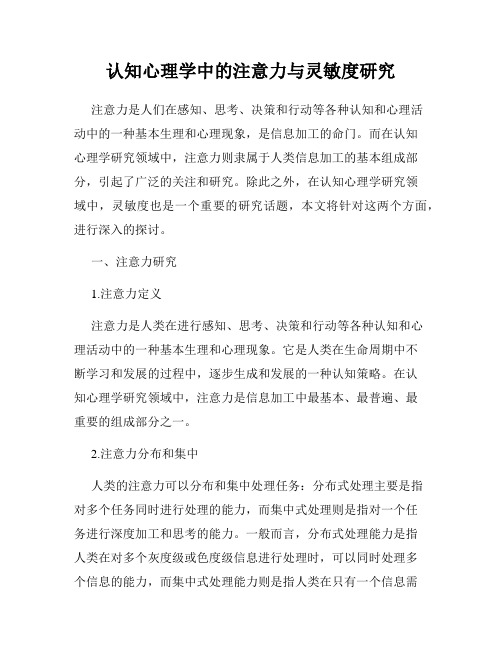
认知心理学中的注意力与灵敏度研究注意力是人们在感知、思考、决策和行动等各种认知和心理活动中的一种基本生理和心理现象,是信息加工的命门。
而在认知心理学研究领域中,注意力则隶属于人类信息加工的基本组成部分,引起了广泛的关注和研究。
除此之外,在认知心理学研究领域中,灵敏度也是一个重要的研究话题,本文将针对这两个方面,进行深入的探讨。
一、注意力研究1.注意力定义注意力是人类在进行感知、思考、决策和行动等各种认知和心理活动中的一种基本生理和心理现象。
它是人类在生命周期中不断学习和发展的过程中,逐步生成和发展的一种认知策略。
在认知心理学研究领域中,注意力是信息加工中最基本、最普遍、最重要的组成部分之一。
2.注意力分布和集中人类的注意力可以分布和集中处理任务:分布式处理主要是指对多个任务同时进行处理的能力,而集中式处理则是指对一个任务进行深度加工和思考的能力。
一般而言,分布式处理能力是指人类在对多个灰度级或色度级信息进行处理时,可以同时处理多个信息的能力,而集中式处理能力则是指人类在只有一个信息需要加工和思考时,可以通过深度加工和思考,促进信息的理解和记忆。
3.注意力选择与控制人类的注意力可以针对不同的信息进行选择性加工和处理。
即人们可以通过选择性地关注某些信息或者限制无关信息的干扰,来管理和控制自身的认知过程。
在选择性注意方面的研究中,心理学家可以运用诸如Stroop效应、一致性任务、有效性任务等实验方法来探究人们在自然环境中注意选择和控制等基本过程。
4.注意力的脑机制最近的认知神经科学研究表明,人类的注意力和相关的认知功能和神经机制密切相关。
在进行注意力加工时,人脑区域会受到特定神经机制、神经化学物质、神经回路和当下任务状态等多种影响,同时不同的任务形式、任务难度和任务类型也会对脑区调制机制产生不同的影响。
二、灵敏度研究1.灵敏度的定义在认知心理学中,灵敏度(Sensitivity)是指人们对某项任务或某一类任务所表现出的感知能力,通常简称为灵敏度。
- 1、下载文档前请自行甄别文档内容的完整性,平台不提供额外的编辑、内容补充、找答案等附加服务。
- 2、"仅部分预览"的文档,不可在线预览部分如存在完整性等问题,可反馈申请退款(可完整预览的文档不适用该条件!)。
- 3、如文档侵犯您的权益,请联系客服反馈,我们会尽快为您处理(人工客服工作时间:9:00-18:30)。
多态模型
• Johnston and Heinz(1978)提出一个更 广泛的理论(multimode model)
• 注意是一个灵活的系统,它允许在不同 的阶段选择信息
– 第一个阶段:构建刺激的感觉表征(过滤器 起作用)
注意
• 注意的四大功能
– 分配(divided attention ) – 警醒与信号检测(vigilance and signal detection) – 搜索(search) – 选择(selective attention)
知觉、注意与意识之间的关系
• Marcel(1983)模型
– 无意识中的知觉匹配(between the sensory data and the perceptual hypotheses regarding various properties and objects )
– 第二阶段:构建语义表征 – 第三阶段:感觉和语义表征进入意识(后选
择起作用)。
注意、能量与心理努力
• 如果将注意比作瓶颈,则当前最合适的比 喻是聚光灯——聚光灯比喻(spotlight metaphor) 。这个理论认为注意如同聚光 灯,可以改变效力,即对准一点,周围灯 光可强可弱,取决于灯的大小和强度。
• Treisman(1960) 的attenuation model认为, 接收的信息要经历三种分析或检验:
– 分析刺激的物理属性; – 确定刺激是否语言,如果是,就将它们分为
音节和单词; – 识别单词并赋予意义。
• 三个阶段并非全部需要。
后期选择理论
• Deutsch and Deutsch(1963)的后期选择模 型(late-selection model)
• 分配性注意 – 双任务工作 自动化的注意假设 – 心理不应期 注意瞬断研究
选择性注意
• 选择性注意(可以同时注意的事物数目是有限的。
• 日常生活、实验室研究和神经生理学研究 中得到的证据显示,受到积极注意的信息 与受到忽视的信息在加工上是不同的。
deep structure. The former / side of the road
seemed to be filled with singing birds; the path itself looked smooth and inviting. • 右耳:At long last they came to a fork in the road but did not know which way to go. The
• 过滤器理论、衰减器理论、后选择理论、 多通道理论、注意、容量与心理能力、图 式理论
过滤器理论
• Broadbent(1958)提出过滤器理论(filter model )
– 同一时间可以被注意到的信息量是有限的; – 如果信息量超过限度,注意过滤器就将选择让一
些信息通过,并将另一些信息排斥在注意之外。
– 州,岛,泛 ——? 答:广
• 舌尖现象(tip-of-the-tongue phenomenon )
本章内容
• 选择性注意 – 过滤器理论 衰减器理论 后期选择理论 多态 模型 注意 容量与心理能力 图式理论
• 注意的神经心理学研究 – 视觉注意的神经网络 事件相关电位与选择性注 意
• 自动化与练习效应 – Stroop任务 自动化与注意(控制)性加工
反对意见和解释
• 鸡尾酒会效应(cocktail party effect): 先听到自己的名字才转移注意。
• 解释:注意的偶然转移
Treisman实验
Treisman实验
• 左 耳 : Many linguists make a distinction between the logical form of a sentence and its
• 所有的信息都被传送到工作记忆中,这 种传送是以平行的形式进行的。
• 在工作记忆中,依据材料的重要性做出 判断决定是被精细加工还是被遗忘。
MacKay (1973)实验
• Attended ear: They were throwing stones at the bank.
• Unattended ear: a biasing word “river” or “money”.
trees on the left / term refers to the
relationships among the logical subject and object; the latter to what is called “meaning.”
Wood and Cowen实验
衰减器理论
• After hearing…, presented with:
– They threw stones towards the side of the river yesterday.
– They threw stones at the savings and loan association yesterday.
– 成功的匹配向意识“报告”(Consciously, we are aware only of the reported objects or properties.)
– 无意识中的信息和无意识认知过程仍能影响其它认知 任务
• 注意与意识——无意注意、有意注意、有意后注 意
前意识
• 启动效应(priming) • Dyads of triads
实验验证
• 实验(1954):两种呈现刺激的方式
– 第一种是通常方式接收声音刺激:例如左耳= 右耳=734215;
– 第二种是分听方式(dichotic listening task), 即左耳=734,右耳=215。
– 通常方式+任意顺序:正确率93%; – 分听方式+任意顺序:正确率降低到65%; – 分听方式+时间顺序:正确率降低到约20%。
